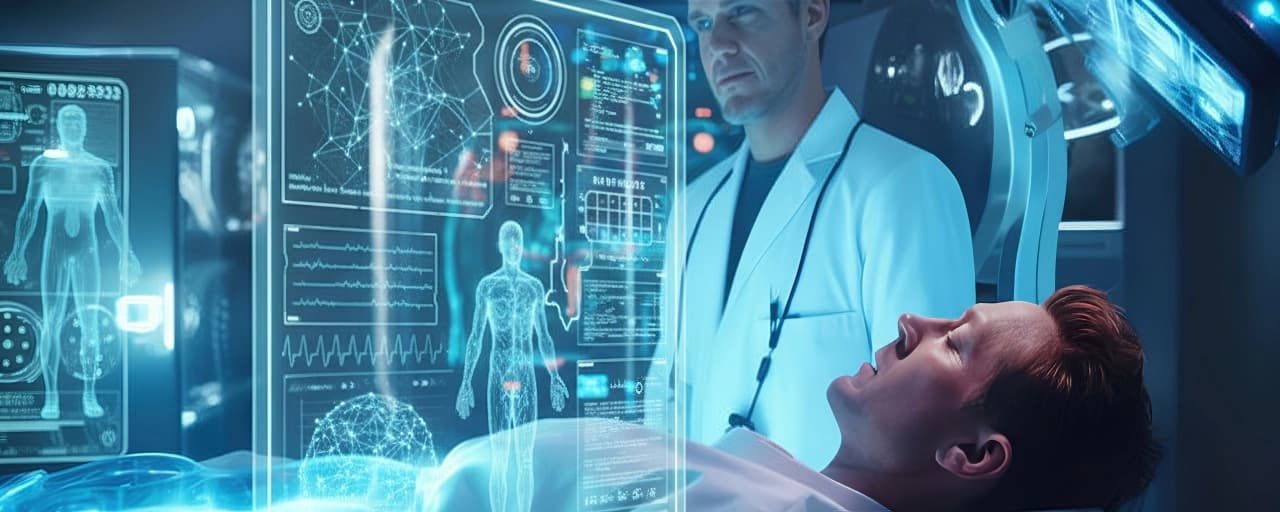AI in Healthcare: Revolutionizing Patient Care and Medical Efficiency

AI in healthcare is transforming how hospitals, clinics, and life sciences companies operate. From diagnosing diseases to managing patient data, artificial intelligence is helping providers deliver better care while reducing costs.
A report from Accenture estimates that AI in healthcare could save the U.S. industry over $150 billion annually by 2026 through efficiency gains and automation.
AI isn’t replacing doctors, it’s helping them make faster, more accurate decisions.
What Is AI in Healthcare?
AI in healthcare refers to the use of algorithms, data analysis, and automation to improve clinical and operational processes. These systems analyze patient data, detect patterns, and predict outcomes that support physicians and medical staff in making informed decisions.
Applications range from medical imaging and drug discovery to hospital management and patient engagement. The result is faster diagnosis, more personalized treatment, and improved patient outcomes.
How AI Is Changing Healthcare
AI in healthcare enables automation and intelligent decision-making at every stage of the patient journey. From early detection of diseases to virtual care, AI enhances both medical and administrative functions.
Key examples include:
- Medical Imaging: AI detects anomalies in X-rays, MRIs, and CT scans with accuracy often exceeding human radiologists.
- Predictive Analytics: AI predicts patient readmission risks, disease progression, and treatment responses.
- Administrative Automation: AI tools handle billing, scheduling, and record management, freeing staff for patient care.
- Virtual Health Assistants: Chatbots guide patients with medication reminders or appointment scheduling.
Benefits of AI in Healthcare
- Improved Diagnostics: AI systems can analyze images and lab data faster than humans, reducing diagnostic errors by up to 50% according to Stanford Medicine.
- Cost Reduction: Automating repetitive administrative tasks lowers overhead costs.
- Faster Research and Drug Discovery: AI shortens drug development timelines by identifying potential compounds in weeks instead of months.
- Personalized Treatment Plans: Machine learning models recommend customized therapies based on genetic and lifestyle data.
- Predictive Healthcare: AI detects potential health risks before they become critical, improving preventive care.
AI in Clinical Applications
1. Medical Imaging and Diagnostics
AI imaging tools like Google’s DeepMind Health and Zebra Medical Vision can spot early signs of cancer, cardiovascular disease, and diabetic retinopathy. Hospitals adopting AI-assisted imaging have reported up to 20% higher diagnostic accuracy.
2. Drug Discovery and Development
AI speeds up the drug discovery process by analyzing molecular data to predict how compounds will interact. Pfizer and IBM Watson used AI to accelerate cancer drug research, cutting development time by nearly 30%.
3. Virtual Nursing Assistants
AI-driven assistants monitor patient health in real time. Apps like Sensely provide remote consultations and track patient conditions using speech recognition.
4. Predictive Health Analytics
Predictive models identify patients at risk of chronic conditions or hospital readmissions. Healthcare providers use these insights to plan early interventions.
5. Robotic Surgery
AI-powered robots assist surgeons with high-precision procedures, minimizing risks and improving recovery times. The da Vinci Surgical System is a well-known example.
AI in Healthcare Operations
Beyond clinical uses, AI improves the operational efficiency of healthcare institutions.
- Administrative Automation: Automating data entry workflow and billing reduces paperwork.
- Resource Allocation: Predictive analytics help hospitals plan staff schedules and manage inventory.
- Telehealth Optimization: AI integrates with telemedicine platforms to triage patients and recommend care paths.
- Fraud Detection: Machine learning identifies abnormal claim patterns to prevent insurance fraud.
Challenges of AI in Healthcare
While the impact of AI in healthcare is massive, integration poses some challenges:
- Data Privacy and Security: Protecting patient data is critical under regulations like HIPAA and GDPR.
- Algorithm Bias: Biased data can affect diagnostic accuracy.
- Implementation Costs: Initial setup and training require investment.
- Ethical Concerns: Clear guidelines are needed for AI use in decision-making.
Healthcare organizations must combine strong governance with AI deployment to ensure ethical and reliable use.
Real-World Examples of AI in Healthcare
Mayo Clinic
Uses AI models to predict patient deterioration in ICUs, enabling faster intervention.
Google Health
Developed an AI model that detects breast cancer with 9% greater accuracy than radiologists in trials.
Babylon Health
Uses AI chatbots to provide virtual consultations, reducing wait times for patients.
PathAI
Supports pathologists with AI-driven image analysis to detect diseases faster and with greater precision.
The Future of AI in Healthcare
The future of AI in healthcare will move toward predictive and personalized medicine. By 2030, the World Health Organization expects AI-driven systems to become standard in diagnostics, telemedicine, and patient monitoring.
Upcoming trends include:
- Integration of AI with wearable devices for continuous health tracking
- Generative AI for medical documentation and patient communication
- AI-driven clinical trials for faster approval cycles
- Real-time disease outbreak monitoring through global data networks
As healthcare continues its digital transformation, AI will play a key role in improving patient outcomes and operational resilience.
Conclusion
AI in healthcare is revolutionizing patient care, diagnostics, and operational management. Hospitals and life sciences companies adopting AI report improved accuracy, faster treatment times, and reduced administrative burdens. From predictive analytics to robotic surgery, the benefits are real and measurable.
If you’re ready to integrate AI into your healthcare systems, Isometrik AI can help. Its automation and workflow orchestration solutions simplify clinical and operational processes, ensuring accuracy and compliance. Visit Isometrik.ai to learn how AI can modernize your healthcare ecosystem.